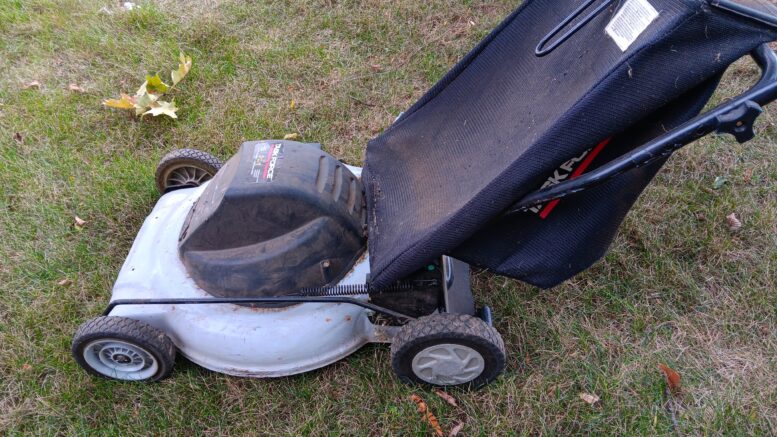Colorado’s first restrictions on the use of gas-powered lawn equipment will impact the state and local governments but not private landscaping businesses, thought state regulators will review the new policy in a mere two years.
The Colorado Air Quality Control Commission on Friday approved new regulations that will ban the summertime use of gas-powered mowers, weed whackers, leaf blowers and other tools by the state government beginning in June 2025 and by some local governments one year later. Commissioners will undertake the standard procedure of reviewing the exact language of the unanimously approved rules in February but are highly unlikely to make substantial changes.
New restrictions impact hand-held devices of 10 horsepower or less, which are used for everything from city-hall maintenance to the mowing of some parks. They affect state agencies across Colorado and local governments within the Front Range area stretching from Douglas County north to the Wyoming line that is in nonattainment of federal ozone standards.
While private landscaping firms will not be subject to the restrictions unless they contact to do work with one of the affected governments, commissioners spent a lot of time debating whether they should be. The rules do not impact private property owners’ use of such equipment.
Dueling lawn-equipment proposals
An alternate proposal from the Regional Air Quality Council sought to ban retail sales of such equipment in the ozone-nonattainment areas beginning in 2025 and bar commercial operators from using gas-powered equipment beginning in 2026.
While that alternate proposal received support from several environmental groups and local governments, however, it generated substantial criticism from landscaping firms and from Colorado residents decrying it as a government overreach. Private firms warned that restrictions would boost their cost of operations substantially and likely produce layoffs in their labor forces, and a majority of commissioners agreed that the proposal seemed a step too far for right now.
Commissioner Gary Arnold, for example, said he did not want to approve something that could affect so many workers — particularly as Latinos make up the majority of landscaping-fire employees across the Mountain West — without getting input from the labor community. And commissioner Patrick Cummins said he didn’t want to move forward with such a significant regulation without analyzing what the cost would be to landscaping companies.
Criticism and defense of policy
This decision to move forward with less stringent regulations at a time when much of the northern Front Range is under severe nonattainment status and facing increased regulations and requirements to use higher-priced, lower-emitting gas next summer brought criticism. Not regulating equipment used by commercial firms or banning commercial sales “felt like dropping the ball,” according to commissioner Jon Slutsky, and commissioner Elise Jones said it doesn’t seem to match the urgency of the moment.
“We appreciate the thoughtful conversation the AQCC had surrounding the topic but are disappointed in the decision to review new language without the stronger measures included,” RACQ spokesman David Sabados said in a statement after the decision.
However, the final decision by the AQCC requested that the Colorado Air Pollution Control Division request a new rulemaking hearing to be held by the end of 2025 on potential commercial-use restrictions on the use of gas-powered push and hand-held garden equipment. That time frame both will give state officials plenty of time to get input from the landscaping industry on what such a rule could mean and, if AQCC decides to enact future limitations, give them enough runway to do it in time for the summer 2027 season, Cummins said.
“I don’t think that even without including commercial today, this is an inconsequential action,” he said. “We are going live in less than 18 months with a program that will encompass a significant number of private entities — including private entities contracted by a government.”
Why the focus on gas-powered lawn equipment
Over the past year, the AQCC has passed new regulations that require reduction of emissions by the state’s largest manufacturers, by large commercial buildings and by any polluting company working in a disproportionately impacted community. Also on Friday, it approved a new plan to bring the state into attainment with U.S. Environmental Protection Agency ozone standards that will require oil and gas companies to reduce the intensity of their emissions of nitrous oxide, a precursor to ground-level ozone.
Groups like the Colorado Public Interest Research Group (CoPIRG) began focusing on gas-powered equipment as a potential target for regulation several years ago as they learned that emissions from this sector are a significant part of the state’s pollution portfolio. Gas-powered lawnmowers, weed whackers and other lawn-care instruments are estimated to be responsible for 75% of non-road volatile organic compound emissions in the state — a category that also includes agricultural, aviation, railroad, recreation and commercial equipment.
But operators of landscaping business said that even as they want to clean up emissions, they can’t replace all their equipment simultaneously because of the costs it would incur. Ben Fisk, owner of Fisk Lawnscapes in Colorado Springs, testified that electrifying equipment for just five of his crews would carry a price tag of $150,000 — a cost he could realistically pay only over a four- to five-year period.
